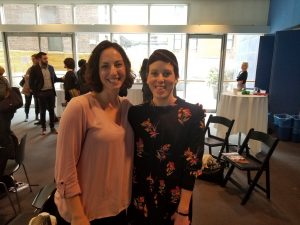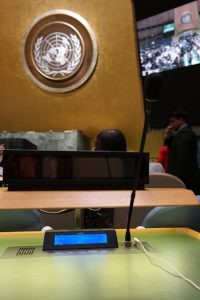
Marianna Bonanome, Co-director of the CUNY/UNESCO Partnership Program and Kate Linkins, Partnerships and Outreach Specialist, The Global Education Monitoring Team
On International Women’s Day, Thursday, March 8, 2018 at 9 am a group of us representing CUNY were invited to attend the 2018 GEM Report Gender Review at New York’s remarkable Scandinavia House. On the surface we seemed an odd assortment consisting of faculty, graduate students/Writing Across the Curriculum fellows and our undergraduate CUNY Youth Ambassador, however we were united in our interest in learning more about how gender issues play a role in education globally. Here we share some of our thoughts with you:
“After attending the launch of this year’s GEM Report Gender Review, I was struck by the complexity of factors that affect gender inequality in education. As an educator working in America, I have come to believe (naively, perhaps) that gender iniquities are an ideological issue that I can redress through inclusive, reparative teaching practices. How startling, then, to learn about the institutional barriers to equal education in developing nations! The statistic that stood out to me most was that ten percent of African girls miss class during menstruation because their schools lack same-sex bathrooms with feminine hygiene products. This troubling fact demonstrates that promoting gender equality is not merely a matter of pedagogy; rather, the creation of an accessible, safe, and equitable learning environment must be the imperative of educators, the local community and its leaders, and each nation’s civil servants.”
Samuel Gold, Graduate Student, English Literature, CUNY Graduate Center and Writing Across the Curriculum Fellow at City Tech, CUNY
“As academics cordoned off in our individual disciplines, we can sometimes lose sight of the unique connections among seemingly separate entities. When I attended the launch of UNESCO’s 2018 Gender Education Monitoring (GEM) report, I expected to learn about the current status of global gender equality in education and perhaps the obstacles interfering with UN 2030 sustainability goals. I was surprised, however, to learn about the sundry other topics that are deeply entangled with the questions of how to increase educational access and decrease gender disparity. For example, it would be difficult to hold this conversation without considering a country’s legal and policy standards, its resource distribution, and its gender norms, values, and attitudes. I was particularly interested to learn about the interactions among promoting educational attainment for women, particularly in STEM fields, and health / environmental outcomes. Tackling the global challenges of tomorrow will require an all-hands-on-deck approach. Women’s voices and contributions will be essential in addressing healthcare needs, promoting best practices in sanitation, improving water systems management, and engaging in agricultural work and research. The interconnectedness of education, health, water, sanitation and agriculture is an important reminder that none of us exists in our own silo. We are all highly dependent on intertwined systems and the organizations and people who manage them. It was reassuring to learn that there are accountability measures in place to help meet education sustainability goals so that we can recruit these educated women to keep our systems running.”
Yosefa Ehrlich, Graduate Student, Clinical Neuropsychology, CUNY Graduate Center and Writing Across the Curriculum Fellow at City Tech, CUNY
“Many statistics relayed to us at the GEM Gender Review launch were startling! Our perspective on gender in education had previously been narrowly focused to our world here as part of the New York education system. The review was eye opening and motivating. Issues facing women in education run the gamut from lack of same sex facilities in developing nations to lack of affordable childcare in developed nations. Becky Pringle, Vice President of the National Education Association (NEA) was one of the panelists at the Gender Review. She struck a cord with me when she told the story of her initial hesitation upon learning she would be the NEA Vice President. “Who will pick up my children from school and feed them dinner?” she asked herself. Friends in her community stepped up and filled in for her in this important childcare role. Without such support, Pringle, a qualified woman would not have been able to fill this leadership position. Many times I have had to choose between attending or conducting events which would forward my career and taking care of my children due to lack of support – financial and otherwise. It is no wonder that the percentage of women who begin in tenure track positions and achieve full professorship is a paltry percentage. It is also no wonder women are underrepresented in politics on all levels in all countries. So much of our struggle is rooted in the systemic and until these real logistical issues are recognized and addressed, not much can change. However, what can be immediately addressed lies at the personal level – we can all choose to care for and support each other just as Becky Pringle’s community did for her.”
Marianna Bonanome, Associate Professor, Mathematics Department, Co-director Opening Gateways Title V Grant, Co-director CUNY/UNESCO Partnership, Co-coordinator Writing Across the Curriculum (WAC) Program, City Tech, CUNY





